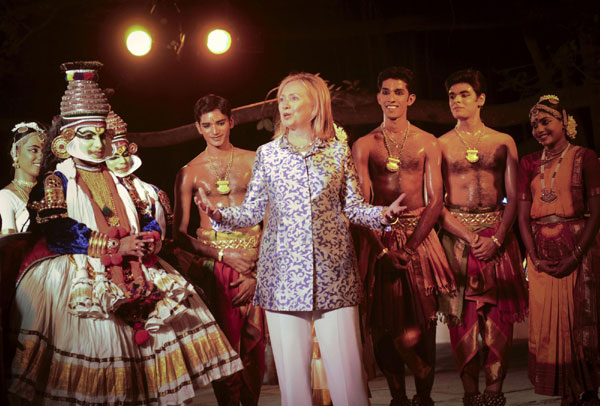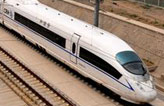Asia
Clinton urges India to expand influence
Updated: 2011-07-21 09:00
(Agencies)
|
 US Secretary of State Hillary Clinton (C) speaks with classical dancers after they performed Bharatanatyam, a traditional Indian dance, at the Kalakshetra cultural center in the southern Indian city of Chennai July 20, 2011. Clinton told India on Wednesday "It's time to lead," urging the government to do more to integrate economically with neighbours Afghanistan and Pakistan and take a more assertive role across the Asia-Pacific. [Photo/Agencies] |
Clinton, delivering a speech in the southern port city of Chennai, said New Delhi should exercise political influence to match its fast-growing economic muscle.
"This is not a time when any of us can afford to look inward at the expense of looking outward. This is a time to seize the opportunities of the 21st century and it is a time to lead," Clinton said.
US officials billed Clinton's speech as a major address to outline Washington's vision for the US-India partnership in the coming century.
President Barack Obama, on a visit to India last November, publicly backed New Delhi's bid for a permanent seat on the U.N. Security Council and US officials say they are looking to the world's largest democracy to become a more visible partner in facing global challenges.
Clinton listed a range of areas where India and the United States are cooperating, ranging from working on clean energy technologies to addressing concerns over Iran's nuclear program.
But she said India could do more in two key areas: building a leadership role in the Asia-Pacific region, where New Delhi already has a "Look East" policy, and using its thriving $1.6 trillion economy to boost more fragile neighbors, including long-time foe Pakistan and Afghanistan.
In Asia, Clinton said India and the United States had aligning interests and values on everything from maritime security to democracy and human rights.
"Because India shares these values and interests, expanding our cooperation can produce benefits for each of us," Clinton said, adding both New Delhi and Washington could still have "a strong, constructive" relationship with Beijing.
"This will not always be easy. There are important matters on which we all disagree, one with the others. But we do have significant areas of common interest," she said.
"India, China and the United States will have to coordinate our efforts."
India and the United States, once on the opposite side of the Cold War divide, have boosted ties over the past decade, as New Delhi seeks a greater global role but at the same time the country's very DNA is traditionally to avoid being seen siding with one power or the other.
The United States, especially in light of challenges in Afghanistan and Pakistan, wants India to be an all-weather ally, but a large part of the political elite in India still regard Washington with suspicion, partly because of its reluctance to take its side on nuclear-armed rival Pakistan.
Clinton urged greater Indian participation in groups including the annual East Asia Summit, which Washington hopes will become the major regional forum for dealing with political and security issues, and the ASEAN Regional Forum which meets later this week in Bali, Indonesia.
Clinton said India should do more to support both political and economic progress in Afghanistan, where the Obama administration has begun drawing down troops.
India is Afghanistan's biggest regional aid donor, having pledged $2 billion to help build roads and power lines in an attempt to secure influence in a country it considers crucial to its security.
"Drawing down our troops is not the same as leaving or disengaging," Clinton said -- but added that India should join in efforts to help Kabul build a strong economy, and an inclusive democracy, which may provide a bulwark against violent extremism.
"We will continue to encourage New Delhi's constructive role," Clinton said, recognizing that some in India have expressed concerns that Afghanistan's political reconciliation might be manipulated by outside forces such as Pakistan.
"Reconciliation -- achieving it and maintaining it -- will depend on the participation and support of Afghanistan's neighbors, including both Pakistan and India," Clinton said.
"We all need to be working together."
She said India could work with Pakistan and its other neighbors to "adopt new rules for the 21st Century" to bring down trade barriers and encourage regional projects such as a proposed natural gas pipeline stretching from Turkmenistan to India.
E-paper

The perfect cut
Companies need to revamp, standardize to stave off quality challenges
Crowning achievement
Living happily ever after
Let there be smell
Specials

My China story
Foreign readers are invited to share your China stories.

90th anniversary of the CPC
The Party has been leading the country and people to prosperity.

Setting the pace in Turkey
China is building a 158-km high-speed railway in Turkey.

